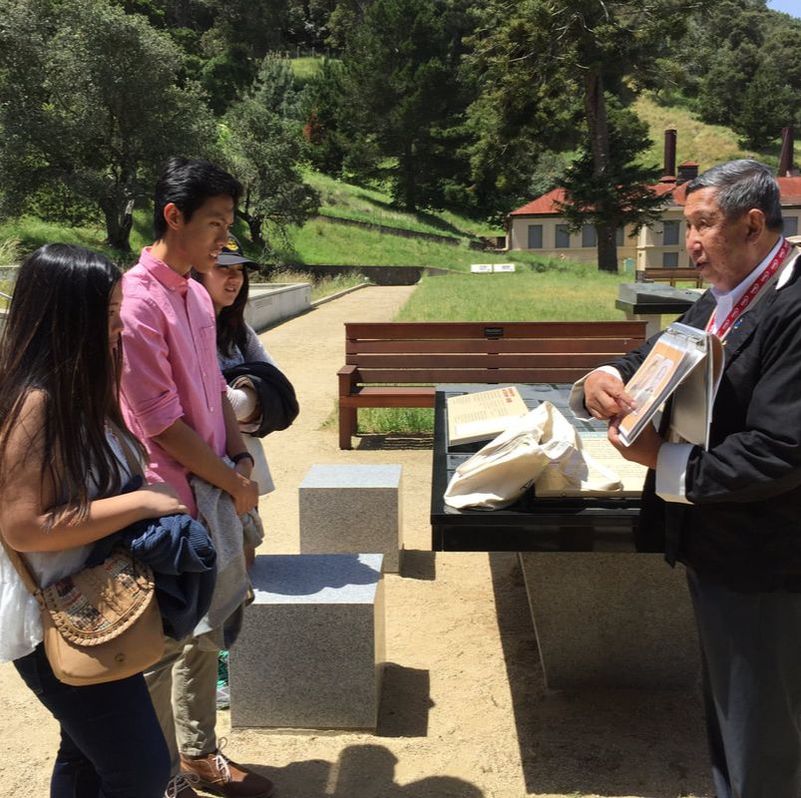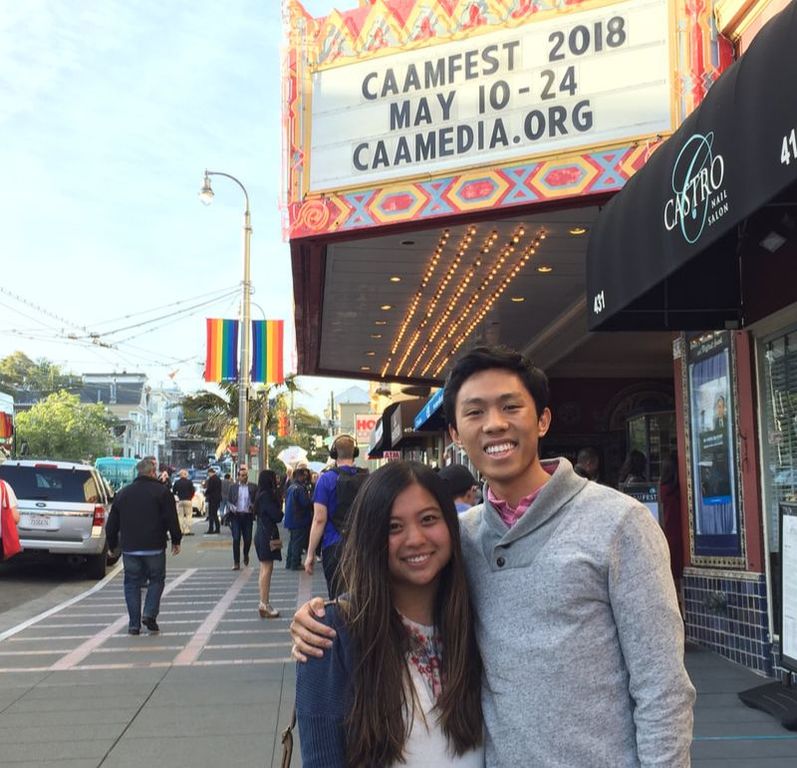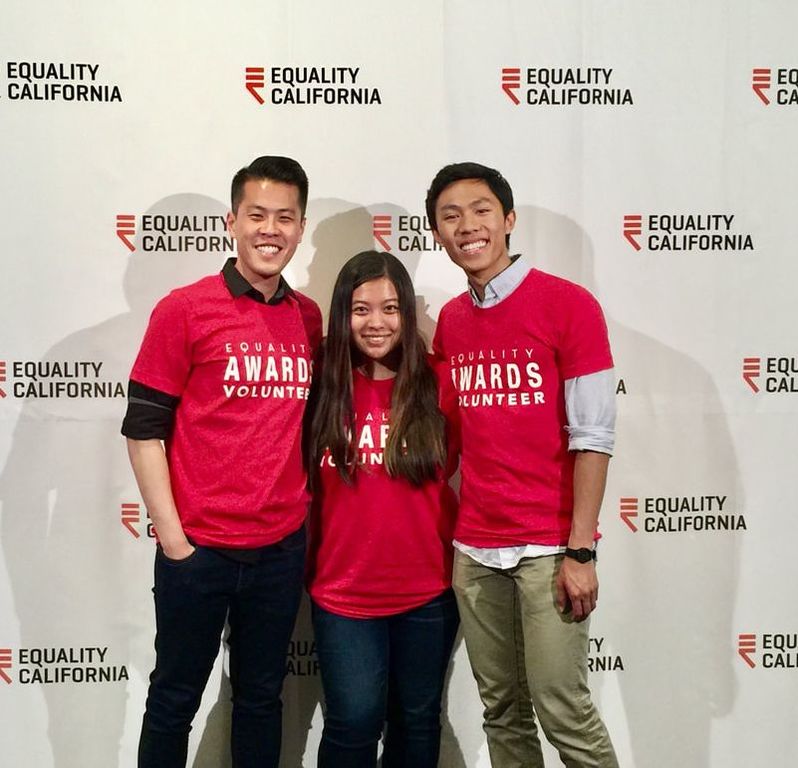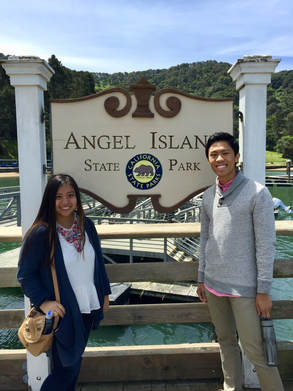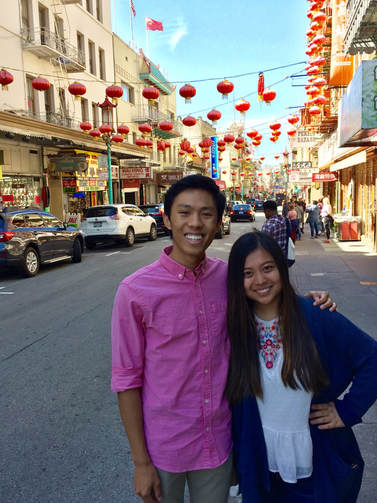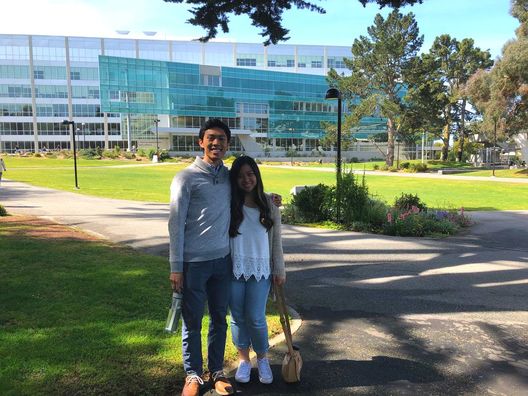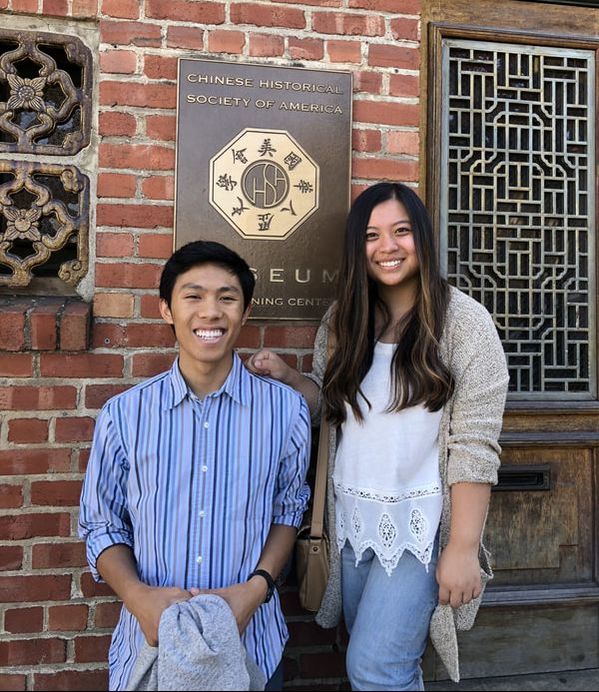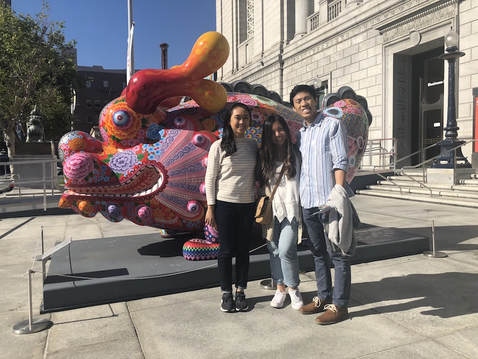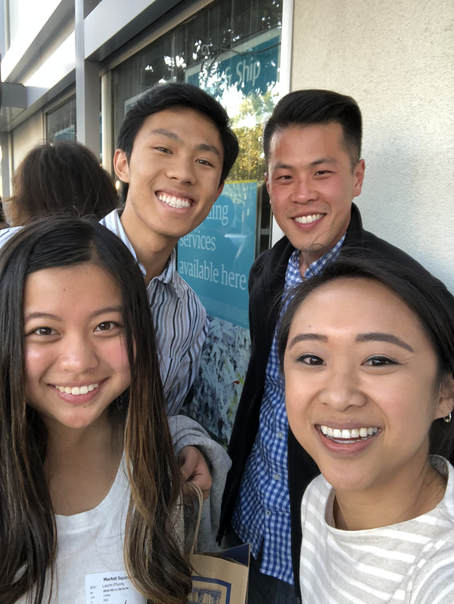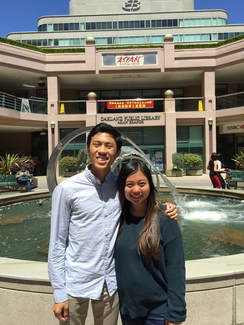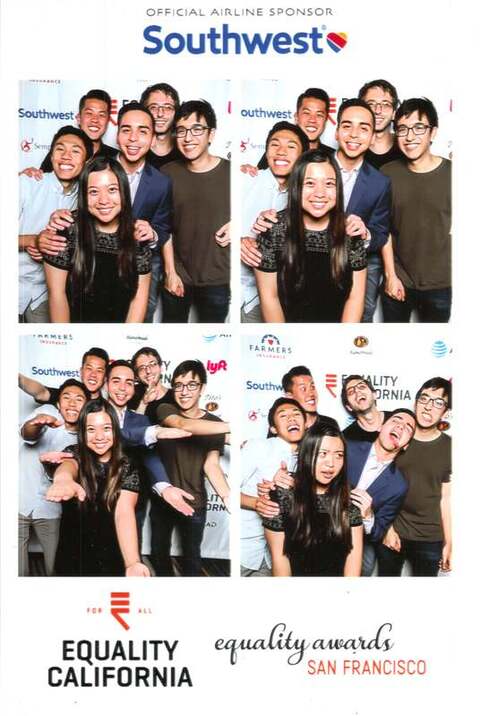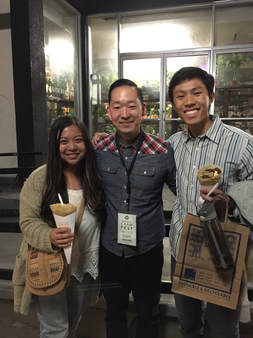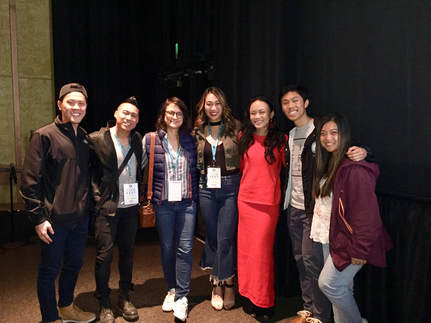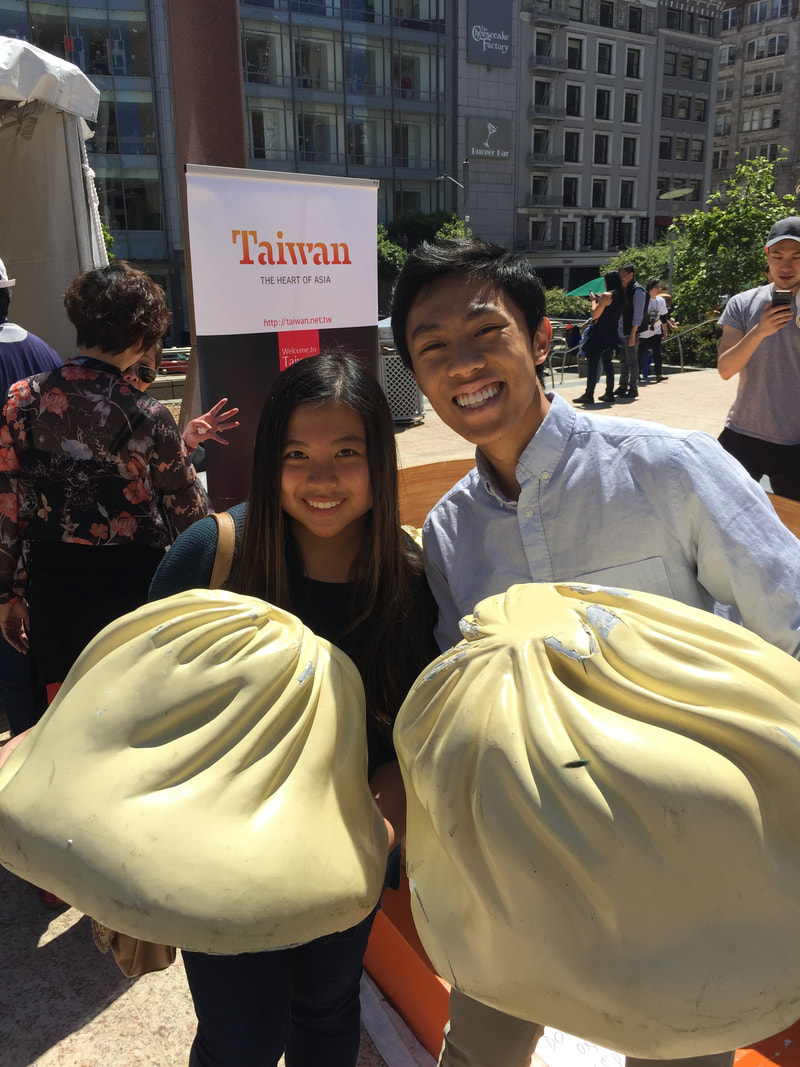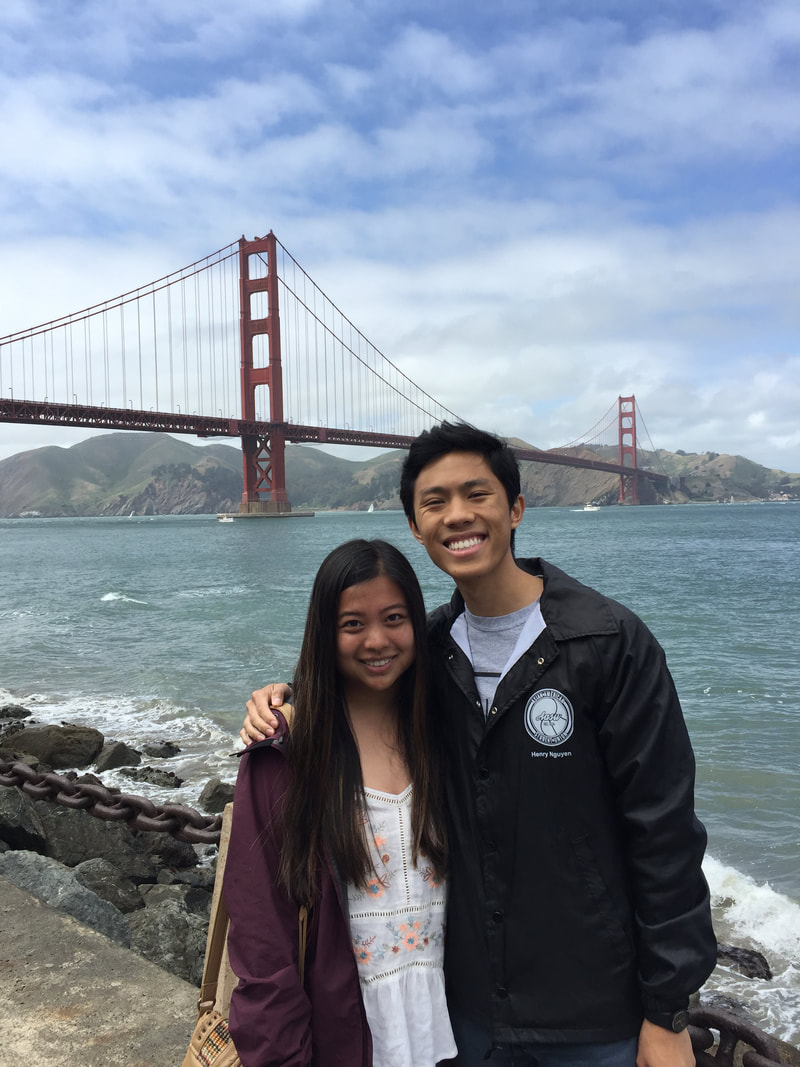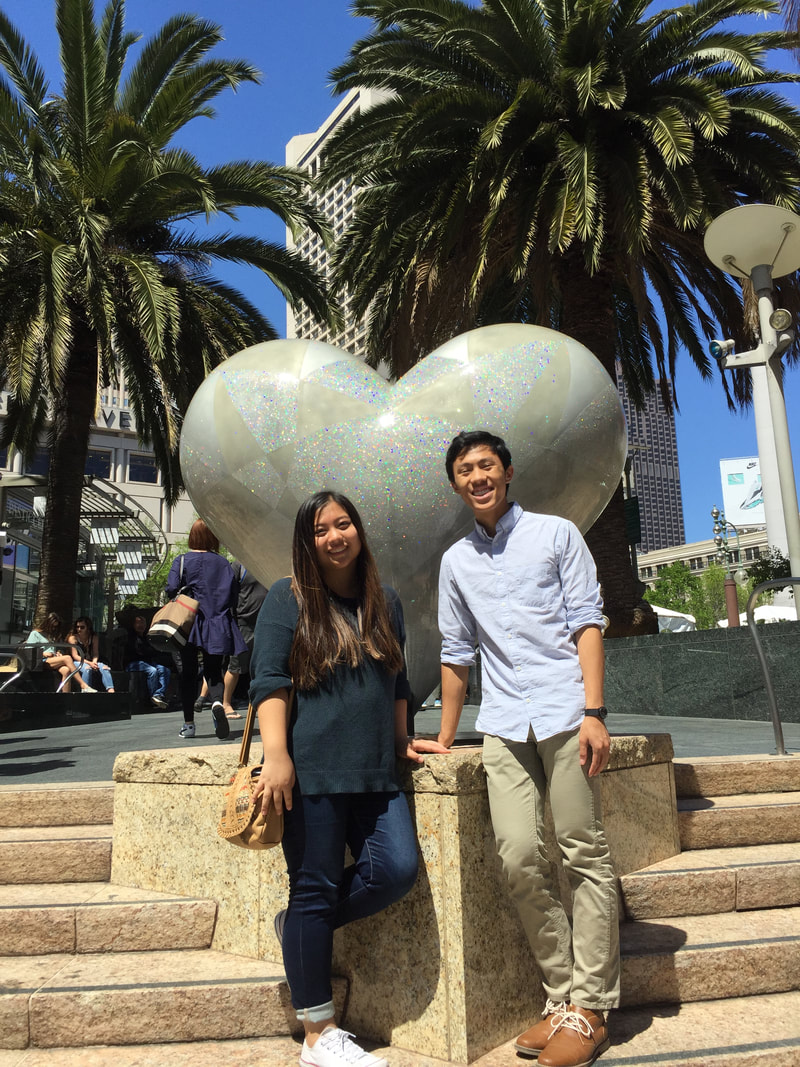Asian American Learning Travel Experience
|
Rooted in the desire to learn more about Asian American history and how the historical events of California have affected and influenced the rest of the nation, the first Asian American Learning Travel Experience sponsored by UF Asian American Alumni has redefined learning outside of the classroom. Before the trip, rising seniors Henry Nguyen (BME '19) and Lauren Vu (PSY '19) had only anticipated visiting and learning about historical landmarks in a touristic type of way, but little did they expect to have connected so deeply to the stories and experiences of the individuals who made this experience so amazing. Rather than just being on the outside looking in, they were immersed in the community and made connections that have not only inspired their upcoming year as co-presidents of the Asian American Student Union but also for the rest of their lives. Read more about their experiences below.
|
Angel Island U.S. Immigration Station Tour
Sponsored by Nirav Patel (BA '11 & MS '13)
|
|
Henry Nguyen
"Our tour guide Sam, a descendant of an individual who passed through Angel Island, had an incredible personal connection to everything he was telling us. Hearing a story from a personal perspective from an individual who actually experienced the history firsthand was such an inspiration to me. Throughout the tour, I learned about the different ethnic groups that were kept at the island, the poetry and writings that the individuals engraved onto the walls, and the struggle of "paper sons." I hope to take this experience with me by sharing my own family story with my community in the same way that Sam did on our tour of Angel Island." |
|
Known as the "Ellis Island of the West", more than 300,000 immigrants passed through Angel Island before entering the U.S. in the early 1900s. |
San Francisco Chinatown
In the 19th century, San Francisco's Chinatown was the largest Chinatown outside of Asia and is the oldest Chinese community in North America.
|
Lauren Vu
"Having been to New York’s Chinatown, I was really surprised to see the difference in community climate between the two Chinatowns. The walkthrough of San Francisco Chinatown allowed me to understand how contextualizing location plays a major role in understanding the dynamic of community. I want to have discussions when I return to UF on what it means to be an Asian American in the South and how we can share our experiences with others who have never been to Florida." Henry Nguyen "I was anticipating a Chinatown that was busy, slightly dirty, and disorganized with vendors on every street corner. As we walked around, I saw that this Chinatown was not as busy and dirty as I had anticipated and was filled with tourists more than anything else. It seemed that many of the stores were catered to tourists rather than to actual community members. We grabbed a few buns at a nearby store and enjoyed a warm snack that felt like home. As I walked around more, I wondered how the modernization of cities and the movement of jobs affected Chinatowns such as this one. To me, this historical and physical site of a Chinese community felt forsaken in a way. I believe it important to discuss physical sites of community and memory and how with the changing tides, they begin to wane." |
An American Story: Norman Mineta and His Legacy
Center for Asian American Media Opening Night Film Screening
Sponsored by Marcus Tran Degnan (BA '15)
|
Lauren Vu
"This was incredibly overwhelming experience in the best way possible! It was amazing to see people of all races and age groups come out to the Castro theatre on a Thursday night to watch a documentary about the legacy of Norman Mineta. The film touched me in many ways particularly how Mineta epitomized selflessness and servant leadership. Despite being sent to the internment camps as a young boy during World War II, he still cared deeply about serving his community and his country. Throughout the film, I often questioned what I was doing and whether my career goals could uplift the community I’ve grown to love. This experience has taught me the importance of understanding the needs of the community I am serving. |
|
|
Henry Nguyen
"For the past few years I’ve always wanted to attend a large film festival. I've wanted to feel the energy of people telling their stories, creating content, and breaking barriers to pursue their passions in film and media. I anticipated a very inspiring night, surrounded by other Asian American identifying people who also felt the same way I did. During the film I was taken away by the depth and scope of the documentary. Mineta’s story of overcoming the prejudices he faced as an Asian American in order to serve his community, then and now, was awe-inspiring. The documentary showed me how sharing my story as an Asian American can have an impact on changing others' perspectives and that being a humble leader and striving for positive change is something that I am capable of. After the screening, the Q&A portion with Mineta himself and the directors of the film were equally inspirational. When I return to UF I hope to share my stories and the stories of others in my community, about their upbringings, how their families came to America, and how being Asian American affects who they are today." |
As the largest Asian American Film Festival, CAAM has attracted thousands of attendees worldwide for the last 36 years. |
San Francisco State University
|
As the result of the Third World Liberation Front strikes in 1968, SFSU became the birthplace of Ethnic Studies and created the first Asian American Studies program in the country.
|
|
Chinese Historical Society of America Museum
Sponsored by Arlene Shi (BS '14)
|
Founded in 1963, CHSA is the oldest organization in the country dedicated to the interpretation, promotion, and preservation of the social, cultural, and political history and contributions of the Chinese in America.
|
|
Lauren Vu
After visiting the Museum of Chinese Americans in New York, I expected to learn in further detail more history about Chinese Americans on the west coast. One section that stood out to me were the Chinese Americans who attended the Ivy League schools back in the 1800s and the 1900s. We often don’t recognize that we had Asian Americans at these prestigious schools at such an early time. In visiting Angel Island and this museum, I've learned the value of having immersive experiences. I'm committed to continuing to educate myself and my community through immersive learning experience rather than through lectures." Henry Nguyen "Unlink other history museums, this museum included moments in history such as the Chinese Exclusion Act and other interesting tidbits such as how Mark Twain played a roll in supporting Chinese immigration. Different aspects of the museum also stood out to me, for example, the immersive projection of documents and texts onto a table that explained the interrogation of Chinese individuals at the Angel Island immigration station. Another part of the museum that I found interesting were the dioramas of houses in San Francisco's Chinatown. In one of them, it displayed a kitchen setting which I found to be somewhat similar to what my own home looked like." |
The Asian Art Museum
Sponsored by Kevin Lee (BS '11 & MA '12)
|
|
Fiction and Other Realities
Center for Asian American Media Film Screening
Sponsored by Vi Ho (B.Design '12)
|
Lauren Vu
"In the Asian American Student Union (AASU) at UF, we offer many opportunities for students to showcase their abilities through song and dance. However, my goal is to provide more opportunities for our student body to showcase other forms of art such as spoken word, filmmaking, and writing! As I’ve seen from this film and through my own personal observations, expression is incredibly important and AASU should strive to provide students more of these opportunities." Henry Nguyen "Greeted by a long line of Asian Americans waiting to enter the theater, I felt very happy to be waiting for this film. The film quickly dove into telling a wonderful story of an individual finding his identity while following his dream. It touched upon subtle aspects of being Asian American, such as when the mother would asked the son if he ate yet, or if he needed money. I felt strongly connected to these scenes in the movie. Even more exciting was the ability to speak and interact with the directors and producers of the film after the screening. The director and main actor even performed one of his songs that he wrote! I am always blown away by seeing how these talented Asian Americans film makers and musicians are!" "My goal is to provide more opportunities for our student body to showcase other forms of art..." -Lauren Vu |
Film/Dialogue/Workshop: The Chinese Exclusion Act
The Oakland Asian Cultural Center
|
Lauren Vu
"Waiting in line for the film, we ran into our Angel Island Tour Guide and it reminded me of how small and inter-connected our community is. Watching Asian American adults involved within all aspects of their community was not something that I saw outside of my Vietnamese church community growing up. Seeing the community center outreach to local elementary, middle, and high schools was really inspiring. Through this community outreach, I saw how Asian American Student Union (AASU) has the capability or the potential to go outwards into other communities. Also, I feel like we all talk a lot about the lack of Asian American representation in our education but I never really thought of ways in which AASU can address that. Perhaps AASU can try to work with other local Gainesville elementary schools to teach them about Asian American history or maybe have a couple of events to expose students to aspects of Asian American history and culture on campus." |
"Building vibrant communities through Asian and Pacific Islander arts and cultural programs that foster inter-generational and cross-cultural dialogue and understanding, collaboration, and social justice."
|
|
Henry Nguyen
"Over the past few days, I had become familiar with different aspects of Chinese American history through the Angel Island tour and the Chinese Historical Society Museum, but I didn’t know how different this film screening would be. Learning that the cultural center that the film screening took place in was a historical space, advocated by community members similar to how our students at UF advocated for a dedicated space for Asian American students on campus, impacted me greatly. There were many historians and speakers in the documentary that spoke with such depth and knowledge about the Chinese Exclusion Act. This film screening empowered me to host events for our UF community in the space that was advocated for by individuals in our own community." |
2018 San Francisco Equality Awards
"Equality California brings the voices of LGBTQ people and allies to institutions of power in California and across the United States, striving to create a world that is healthy, just, and fully equal for all LGBTQ people."
|
Lauren Vu
"I didn’t really know what to expect leading up to this volunteering event! If anything, I expected it to be kind of hectic because I knew it was a larger scale event. I was so impressed by the level of sophistication and professionalism that went into the programming and execution of the event. Through this event, I met a lot of people and was able to talk to alumni Marcus Degnan about his experiences being involved with APIA and the Asian American community on campus. Through this, I was able to see a glimpse of how programming at UF could translate into non-profit work events and large scale programming. Upon my return, I'd like to show students that their work in student organizations can lead to usable experience in the real world and future careers!" Henry Nguyen
"Because of alumni Marcus Degnan and his work at UF, I really wanted to be involved in the LGBTQ+ community. At the event, I assisted with registration and interacted with over 600 people. Just being in an environment that was so positive and warming to the gay community was empowering. It was also amazing to see the first openly gay senator in history, Tammy Baldwin, speak. She and other political figures such as California Assemblyman Evan Low, Congressman Mark Takano, and Georgia House of Representatives Sam Park were all there in attendance representing the gay and Asian communities. After going to this event and interacting with all of the wonderful event coordinators, I really want to be sure that folks that identify as LGBTQ+ are welcomed and comfortable in the UF and AASU communities." |
Stories from the American South
Center for Asian American Media Film Screening
Sponsored By Quynh-Le Nguyen (BA '12)
|
Lauren Vu
"Coming from Florida, it's so rare when we become the topic of discussion. More authentic and a little less 'polished' and 'professional', these films really allowed me to connect with the stories we watched. I enjoyed the 'Cocks Not Glocks' documentary because the girls in the group were so vocal and passionate about starting a dialogue on gun safety on campus. Even seeing them in person caused me to turn into a starstruck fan. However, my personal favorite was the film 'June.' The writer mentioned how he created the film based off a family story and it really showed me the unspoken, seemingly small challenges that Asian Americans had to face when trying to fit into society in the 1950's. Seeing these films showed me that you do not need fancy equipment and professional training to tell a story. Instead, what is really powerful and impactful is our ability to tell stories of what it means to be an Asian American in the South. After watching, I am thinking of ways in which we include our parents’ stories into our programming and discussions. I feel like it is such an important part of our history and experience, but we don’t often share because we are of college age and moved out." |
|
Henry Nguyen
"Looking through all of the different film selections before going to CAAMFest, this series of shorts stood out to me the most. A whole film screening focused on content made and produced in the American South. Since I was born in the Panhandle of Florida, I felt a connection to the American South as part of my identity and I really wanted to explore these films to see what they’ll bring, since films from the South that I’ve seen never depicted stories of Asian Americans. I did not know what I was anticipating since the various films I’ve seen so far were all different. I hoped that this would depict the environment of my home and what I’ve felt in my community as I was growing up. As we watched the 5 different short films, I was continuously mesmerized by how close to home these stories were. From North Carolina to Texas, I was happy to see the diversity in content in these videos. |
|
'June' surprised me to see how Asian Americans continued to try to assimilate into the community in the midst of discrimination and racism. 'Phetmixay Means Fighter' showed to me the love that there is for family and the willingness the director had to capture this story to tell. 'Come and Take It' was very empowering to me as a college student. Seeing a student that engaged in a fight that spanned nationally and the details apart of that story made me think where I stand today. I was inspired by how her parents supported her every step of the way and how she found a community that pushed forward with her. 'Leadway' and 'Whitman, Alabama' were very warming to me in a way that shed light on the Asian and Asian American individuals scattered throughout the South. Seeing the Vietnamese family run a pho shop with their children running around reminded me of my own family and how that was similar to how I was brought up.
Overall, these films made me think very differently of my position in the South. I knew there were Asian Americans scattered around the South, but with these films I felt more empowered and comfortable knowing that I’m not alone. I feel that there is a strong necessity to capture these stories of Asian Americans in the South since we live in a time period where the Asian American experience and stories are much different than other parts of the US. Additionally, we also had a chance to meet and take a picture with the directors. Seeing them in person and briefly chatting with them made me feel very empowered also, since I felt their energy that came as they spoke about the message, story, or meaning behind why they created what they did." |

